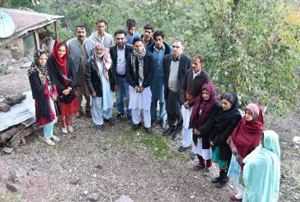Mohammad Khalid, a 39-year-old social worker, belongs to village Talagram, a region surrounded by mountains, which receives heavy rainfall in both the summer and winter season. The village is only accessible through a jeepable 90-minute drive up a steep and narrow winding road from Muzaffarabad, Azad Jammu and Kashmir (AJK). AJK is highly prone to natural disasters and has experienced the worst disaster situations due to earthquakes, torrential rains and floods, landslides and avalanches in the recent past. The village also had massively suffered in the October 8, 2005 earthquake that wreaked havoc in AJK and elsewhere, killing and injuring thousands of people. Since, there is no state-owned or private medical facilities in Talagram, the residents have to travel to Muzaffarabad for even basic first aid. Due to a lack of timely medical care and treatment, there have been multiple fatalities. The Mountain and Glacier Protection Organization (MGPO) supported by USAID Ambassador’s Fund Grant Program (AFGP) implemented the first disaster preparedness project in the area. An intervention that was needed for a long time now.

A nine-month ”Strengthening Community Based Disaster Preparedness and Response in District Muzaffarabad’ project was implemented by MGPO, that aimed at training groups of community members in disaster management skills in areas that are remote and have no or minimal access to state facilities. Under this project, a committee named Disaster Defense Committee (DDC) was constituted of which Mohammad was elected as the President. The primary aim of the committee was to act as first responders during and after a disaster.
The groups, named the Disaster Defense Committees (DDCs), underwent extensive training enabling them to act as first responders in the event of any disaster. MGPO, under the project, formed eight such committees; one at tehsil level, two at union council level, and five at village level. 89 out of the 258 community members trained under the project, were women.
“When the program trainings started, we had no clue what disaster-preparedness is or how to effectively respond to a disaster situation. However, after the training, we are now well-organized and have first aid boxes. We have learned the required management and evacuation skills that make us better prepared for any emergency,” says Mohammad.
MGPO held extensive meetings with relevant government departments from AJK, particularly the State Disaster Management Authority (SDMA) and the Planning & Development Department (P&DD), soliciting their support for the intervention.
The project-implementing organization prepared comprehensive vulnerability and capacity assessment tools for each target location and identified the unique training needs of each locality or village in consultation with the local DDCs and training consultants.
Other than the designing and development of guidebooks on disaster management, a training of DDCs along with their enlistment followed. The three-month training involved imparting critical skills such as first aid, emergency management, evacuation, and communication mechanisms.




















